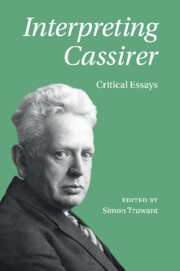Book contents
- Interpreting Cassirer
- Interpreting Cassirer
- Copyright page
- Contents
- Contributors
- Acknowledgments
- Abbreviations
- Introduction
- Part I Cassirer’s Philosophy of Culture
- Chapter 1 Interaction between Language and the Other Symbolic Forms
- Chapter 2 The Status of Art in Cassirer’s System of Culture
- Chapter 3 Being in Time
- Chapter 4 Science As a Symbolic Form: Ernst Cassirer’s Culture of Reason
- Chapter 5 Quantum Mechanics As the Ultimate Mode of Symbol Formation
- Chapter 6 Spirit in the Age of Technical Production
- Chapter 7 Political Myth and the Problem of Orientation
- Part II Cassirer’s Philosophy of Consciousness
- Part III Cassirer’s Philosophical Method
- Bibliography
- Index
Chapter 5 - Quantum Mechanics As the Ultimate Mode of Symbol Formation
The Final Stage of Cassirer’s Philosophy of Physical Science
from Part I - Cassirer’s Philosophy of Culture
Published online by Cambridge University Press: 17 April 2021
- Interpreting Cassirer
- Interpreting Cassirer
- Copyright page
- Contents
- Contributors
- Acknowledgments
- Abbreviations
- Introduction
- Part I Cassirer’s Philosophy of Culture
- Chapter 1 Interaction between Language and the Other Symbolic Forms
- Chapter 2 The Status of Art in Cassirer’s System of Culture
- Chapter 3 Being in Time
- Chapter 4 Science As a Symbolic Form: Ernst Cassirer’s Culture of Reason
- Chapter 5 Quantum Mechanics As the Ultimate Mode of Symbol Formation
- Chapter 6 Spirit in the Age of Technical Production
- Chapter 7 Political Myth and the Problem of Orientation
- Part II Cassirer’s Philosophy of Consciousness
- Part III Cassirer’s Philosophical Method
- Bibliography
- Index
Summary
This chapter examines Cassirer's view on contemporary science. It revisits Cassirer's lesser-known work Determinism and Indeterminism in Modern Physics and argues that it harbors a significantly new stage of his philosophy of physical science. On the one hand, this work presents the quantum formalism as a limiting pole of the Bedeutungsfunktion, the highest mode of symbolic formation according to Cassirer’s “phenomenology of cognition.” Inspired by Paul Dirac, Cassirer understands quantum mechanics as a symbolic calculus for deriving probabilistic predictions of measurement outcomes without regard to underlying wave or particle “images” – or, as an exemplar of abstract symbolic thought. On the other hand, Cassirer recognizes the philosophical significance of the use of group theory in quantum mechanics as advancing a purely structural concept of object in physics. Hence, Ryckman reveals that Cassirer drew epistemological consequences from the symbolic character of contemporary physical theory that retain relevance for philosophy of science today.
Keywords
Information
- Type
- Chapter
- Information
- Interpreting CassirerCritical Essays, pp. 89 - 108Publisher: Cambridge University PressPrint publication year: 2021
Accessibility standard: Unknown
Why this information is here
This section outlines the accessibility features of this content - including support for screen readers, full keyboard navigation and high-contrast display options. This may not be relevant for you.Accessibility Information
- 2
- Cited by
